Richmond Street between Queen and Pownal is getting transformed today into a “sustainable street.” From the Reinventorium we have a bird’s eye view. Here’s the pre-transformation scene at 9:00 a.m.:
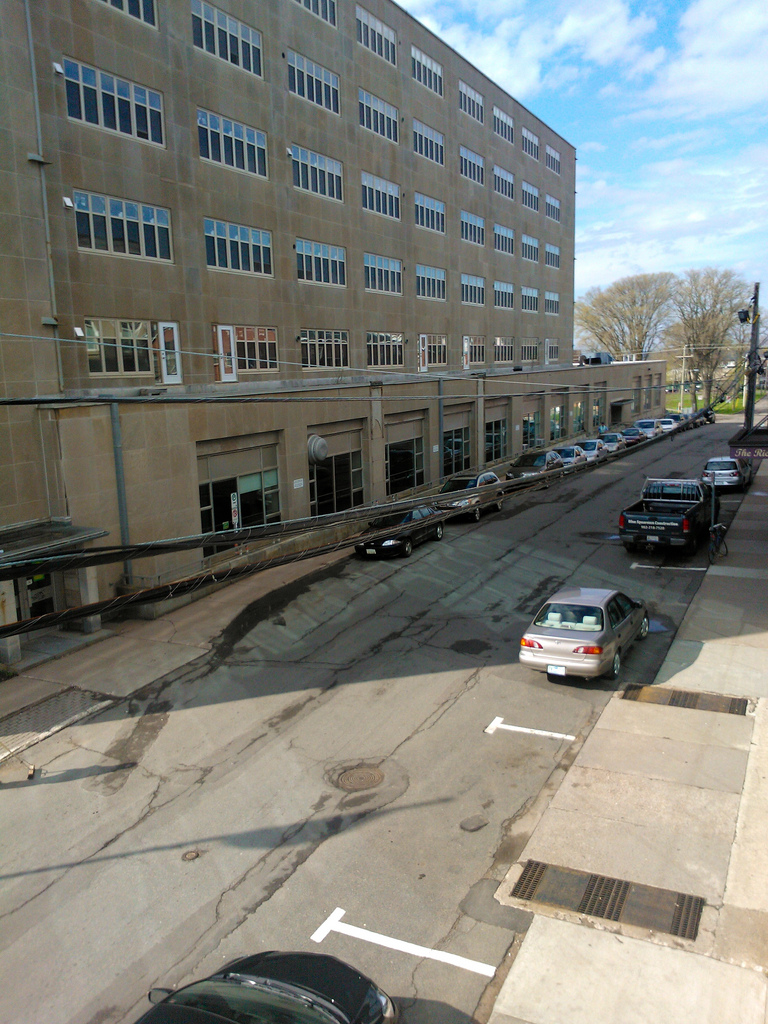
Ate lunch at the Town & Country Restaurant, since torn down:
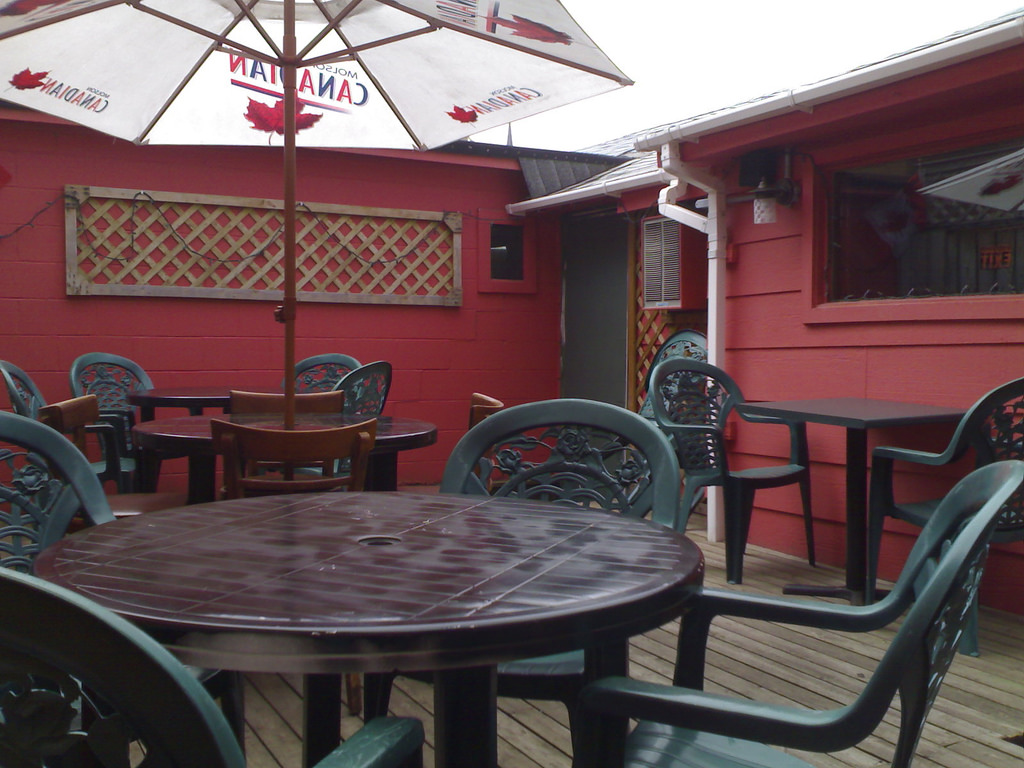
Vestigial oil tank discovered on the playground of Prince Street School:

Olle sent me to the useful How to setup Google Chrome a few days ago. Which, in turn, sent me to Google Reader Readable extension. The extension transforms the visual cacophony that is:
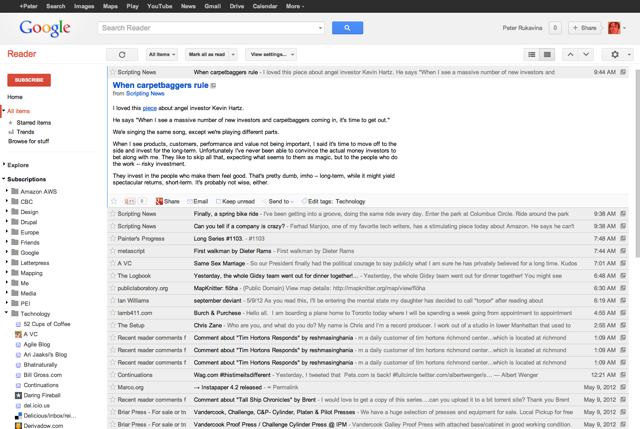
Into the calm simplicity that is:
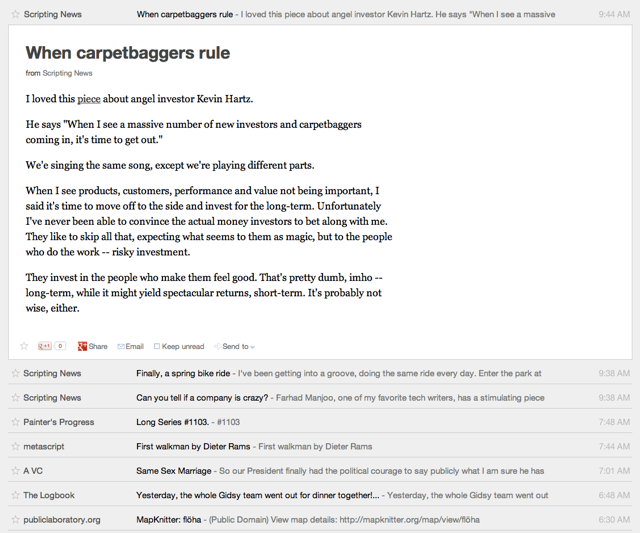
Nothing to set up. No changes to Google Reader required. It’s the most useful of the myriad Google Chrome extensions I’ve come across.
As a pleasant and unexpected coup de grace, Nokia has transitioned Plazes.com into an infographic-rich summary of each user’s Plazes journey. It’s very nicely done. To get yours (and to download your Plazes history and/or transfer your history to Nokia Maps), just login to Plazes.com.
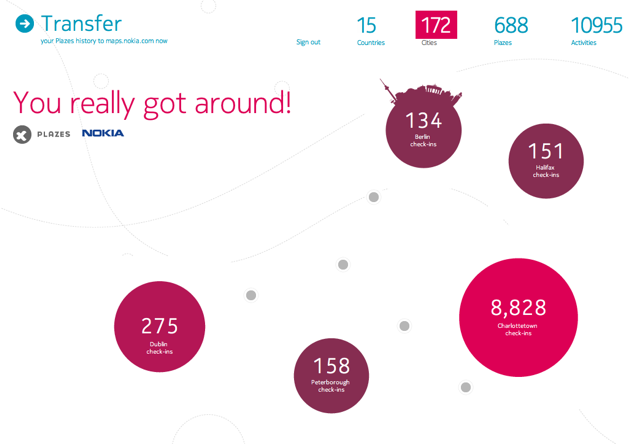
A nice additional touch is that the download package you receive if you choose to grab your Plazes history includes all the infographics for your own account.
Oliver and I have been making the rounds in downtown Charlottetown after supper this week stapling Richmond Street posters on electric poles.
On Monday night we ran out of staples and so popped in to Shoppers Drug Mart on Queen Street to buy some more. When we couldn’t find them on the shelf, I asked a clerk, who looked at the shelf with me and confirmed they didn’t have any. The pharmacist across the hall overheard our search, however, and volunteered some staples from his own stapler; no charge.
On Tuesday night we were walking up Queen Street toward Grafton. Oliver was expressing some interest in an after-supper snack when three young people stopped us on the sidewalk and asked us if we’d like hot chocolate and granola bars.
“Ah… why?”, I said.
“We’re just giving back to the community,” one of them replied.
And so we took a break and enjoyed hot chocolate and granola bars on a bench in the waning spring sunshine.
Both episodes were a technical violation of the age-old dictum to not talk to (let alone accept gifts from) strangers, and demanded an elaboration of the dictum to Oliver.
“It’s okay to accept gifts from strangers if you’re an adult. But you have to go with what your gut tells you.”
“What’s your gut?”, asked Oliver.
“Your feeling about whether the strangers are good people with an honest offer.”
“Okay,” said Oliver.
This is tricky parenting. I want Oliver to be “streetproofed” (and, to a large and possibly extreme extent, he already is), but I also want him to be open to the delightful happenstances that the world has to offer.
With staples and hot chocolate under our belt, and an extra 25 posters still-unposted, I’m eager to see what gifts the streets of Charlottetown will provide us with this evening.
Last year I had the pleasure, along with Jenni Zelin, Rob Lantz and Laura MacPherson, of judging applications to the City of Charlottetown’s Community Microgrants program. After a long process of deliberation, we awarded grants to “Tulips for your Thoughts” (a project to plant tulips along Upper Prince Street; tulips that are about to spring into bloom any minute now), an after-school theatre program at the Murphy Centre, and a project to transform the section of Richmond Street from Pownal to Queen into a “sustainable streetscape.”
The streetscape project was supposed to happen last fall, but the weather intervened, and now it’s scheduled to happen from May 11 to 19, 2012.
I’d been thinking about this project over the winter — newly resident as we are overlooking Richmond Street — and about a month ago I had a sudden vision of a poster to promote the project — a black RICHMOND ST on top with a green RICHMOND ST below — and so in the time-honoured tradition of unauthorized advertising, I’ve been crafting this together for the past couple of weeks. Here’s the result:
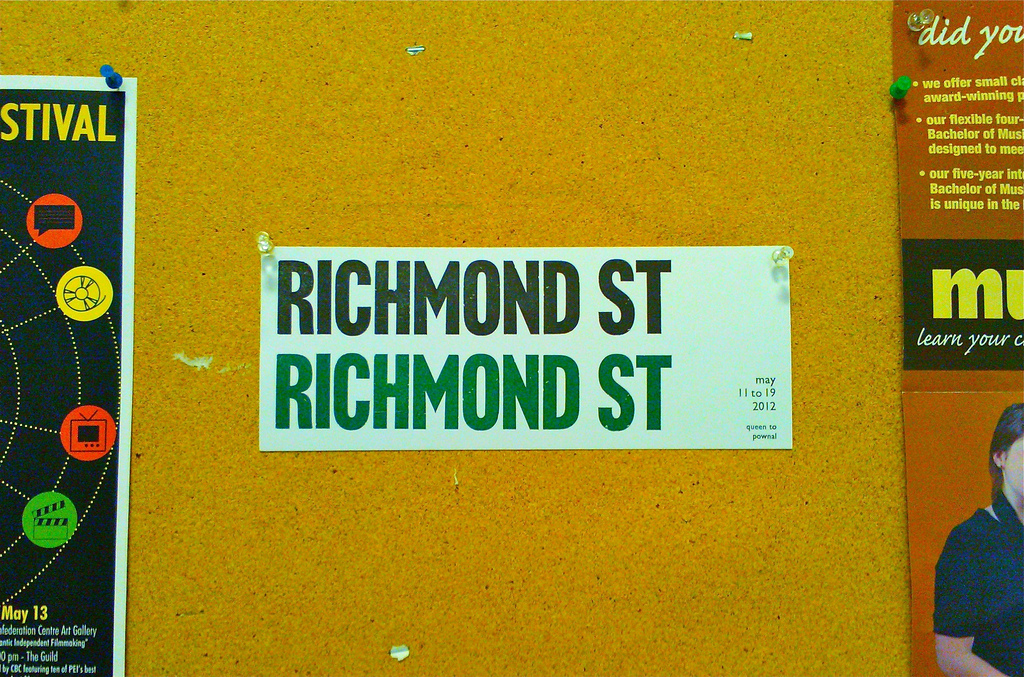
I dipped into the Holland College font of Akzidenz Grotesk for the large RICHMOND ST, and used M&H-cast Gill Sans in 18 pt. and 12 pt. for the date and location. Kwik Kopy in Charlottetown generously donated a Tim Hortons coffee cup of green ink. The paper is inexpensive white 110 lb. card stock from Staples.
Two recent arrivals to the print shop aided significantly in the printing of the posters, both ordered a few weeks ago from NA Graphics in Colorado.
First, a set of three Kort Adjustable Quad Guides. These aren’t cheap — about $10 each — but they are the Cadillac of gauge pins, and once I learned how to insert them into the tympan — there are handy instructions included that need to be followed carefully — I was left with a fantastic immovable paper-holding force:
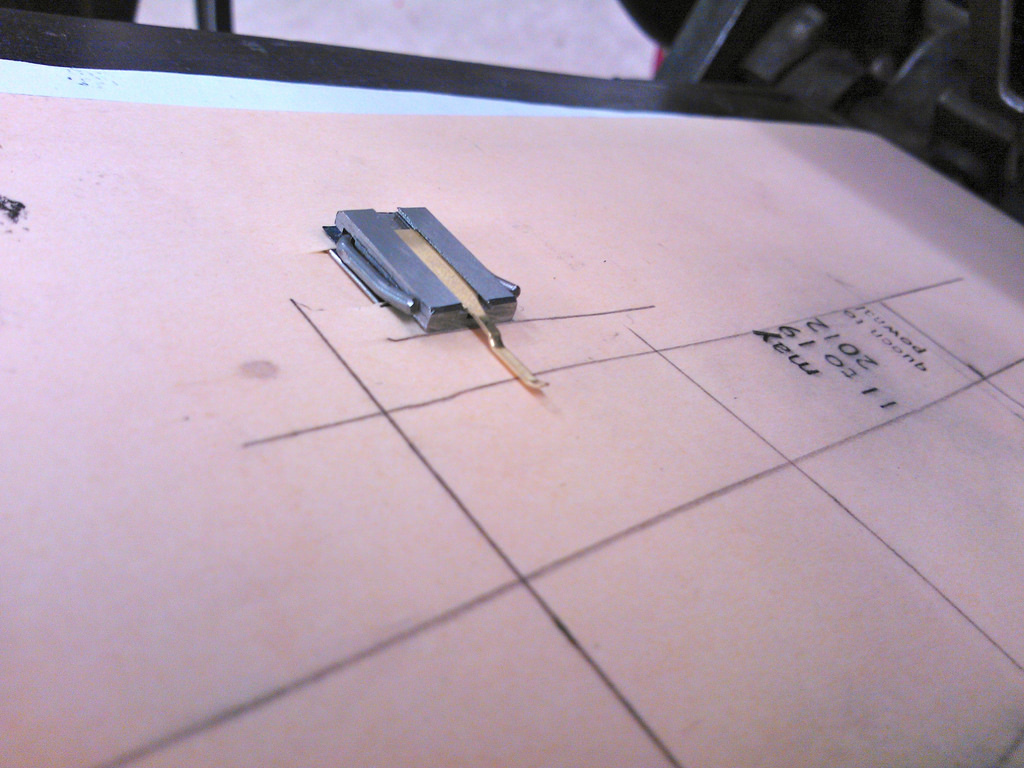
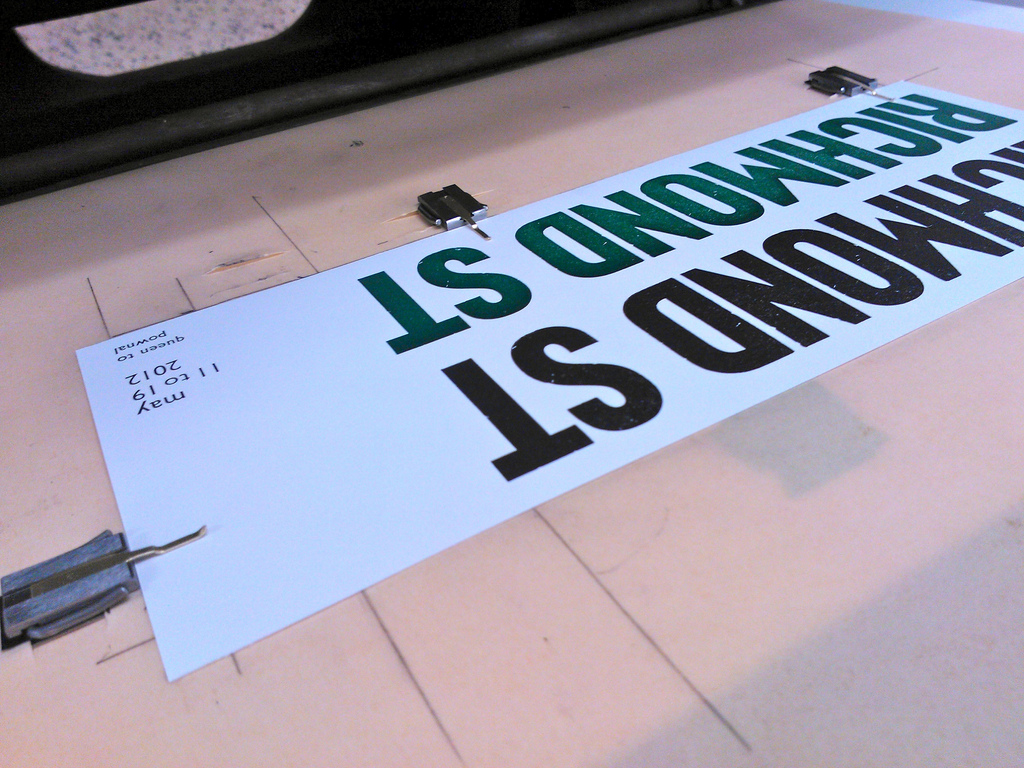
It’s hard to overstate what an aid to printing this is: in my early makeready experiments last week, using some aging and partially smashed spring tongue gauge pins to hold the paper in place, I lost as many copies of the poster to the inside of the press (falling off the pins from the sticky force of the inked type pulling off). With the new pins in place I didn’t lose a single one.
The other item from NA Graphics was a 100-sheet package of tympan — oiled paper that’s sits as the top layer of the “packing” that sits under the paper to be printed. It has the benefit of being stiff (which is great for inserted the gauge pins), sturdy (so it doesn’t easily rip) and its oily coating means that you can print a guide print on it, then wipe of the excess ink and not end up with ink on the underside of what you’re printing:
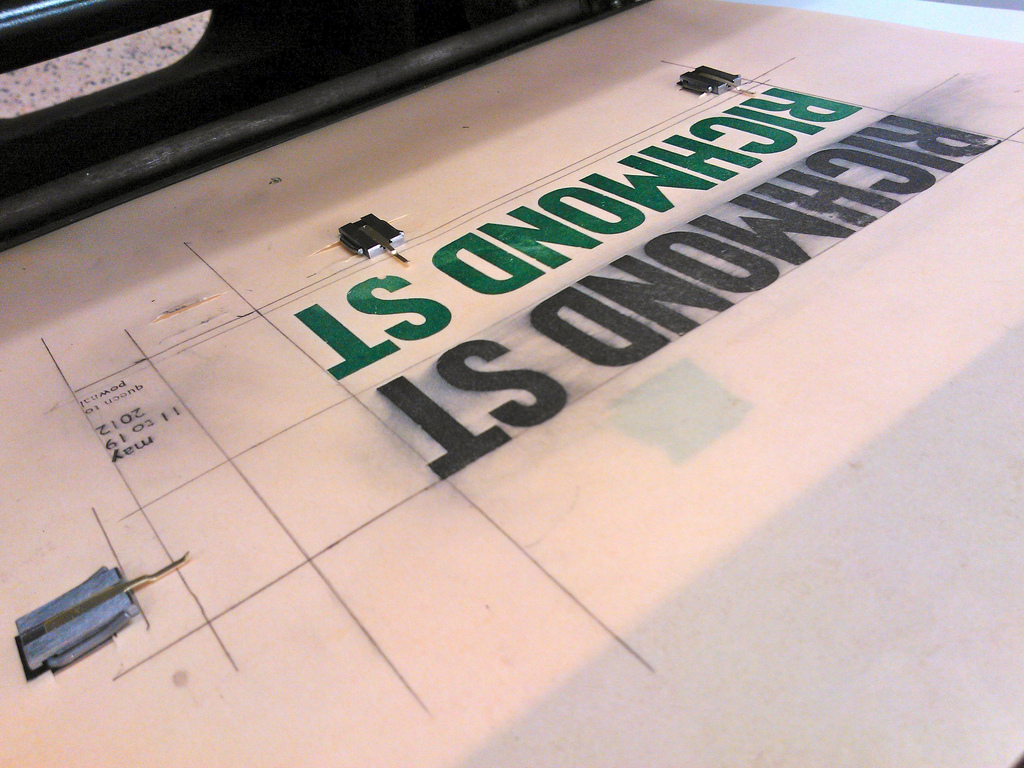
Other than an unfortunate tongue-clash incident (the brass tongue of one of the gauge pins was aligned so as to crash into the “S” in “ST”), quickly solved by some adjustments, the printing went well. I discovered that if I wear disposable latex gloves while printing it’s a lot easier to grip the paper, both from the table to the press and off the press to the table. Once I was set up and in a rhythm I was cranking out 10-15 impressions a minute.
I printed the black ink first, then the green (I’d laid out the type to facilitate simply popping out the date and location and sliding the “RICHMOND ST” down into position for the green).
Watch for the posters on a telephone pole or shop window near you. And do come out to participate in the event starting a week from tonight on May 11, 2012.
I first read about Plazes, the pioneering geolocation site that consumed much of the late 2000s for me, from Joi Ito and I signed up for an account on September 26, 2004, eight years ago, and “plazed myself” from the old Reinvented office. I was user number 1185.
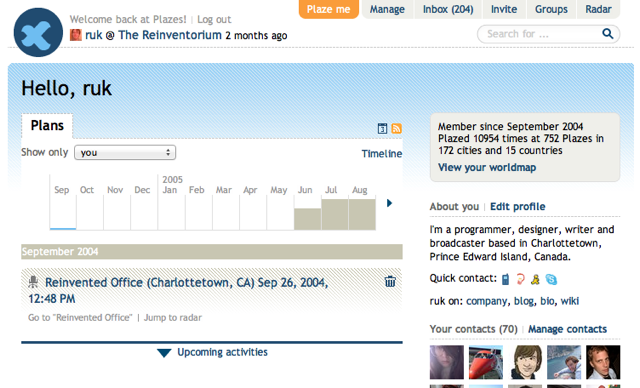
In the intervening years I visited 752 “plazes” in 172 cities in 15 countries and plazed myself another 10,954 times, which was slightly more than Plazes co-founder Stefan Kellner (9,948) and slighly less than Plazes co-founder Felix Petersen (11,822).
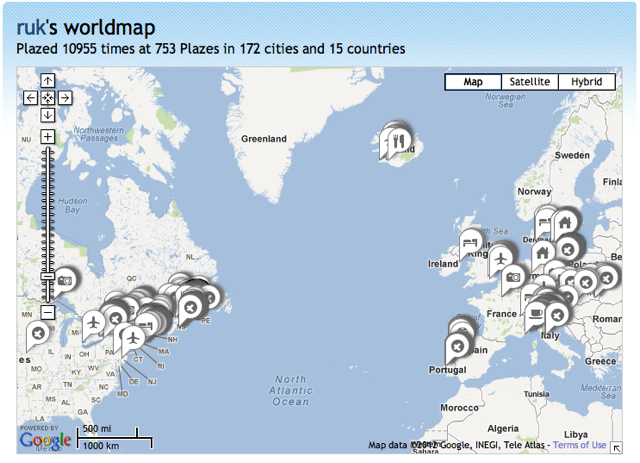
Although I signed up in the fall of 2004, Plazes didn’t really come into its own for me until the 2005 reboot conference in Copenhagen, where I had the seminal Plazes experience, meeting Ton Zylstra and Martin Röll (who remain good friends to this day).
After several years of being a Plazes power-user, in November of 2006 I got hired on to develop an explanatory screencast about Plazes, which I just dug out of the archives and uploaded to YouTube and the Internet Archive for posterity (note the references to the hot social networks of the day — MySpace, Friendster and TagWorld).
In June of 2007, after I liveblogged a visit to Plazes HQ, I formally joined the Plazes team as a User Advocate, working remotely from Charlottetown, where I blogged, hacked (including working with Til on a skunkworks Plazes.net project), developed and organized PlazeCamp in January of 2008:
On the tail end of the reboot conference in 2008 it was announced that Nokia had acquired Plazes. I stayed on as a Nokia contractor for a few months, but eventually it was clear that Plazes was going to become something different — perhaps integrated into Nokia’s Ovi Maps product — and not a standalone product with a need for someone like me, and so I stepped back into power-user-hood.
In the intervening 4 years we of the Plazes faithful have been assuming that we’d simply wake up one day and find that Nokia had taken Plazes offline. This morning the email came, albeit with some advance warning:
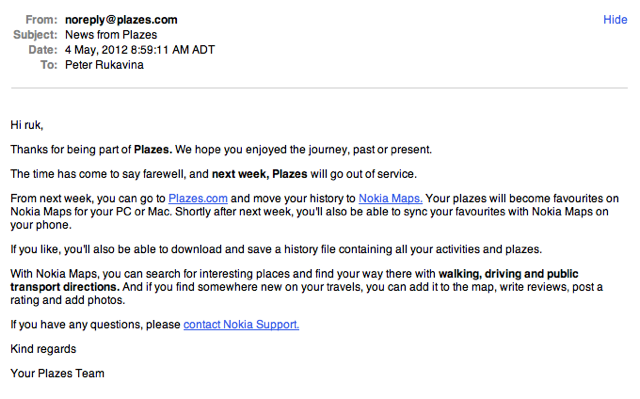
Logging in to Plazes one last time I joined members of the old team in one last plazing:
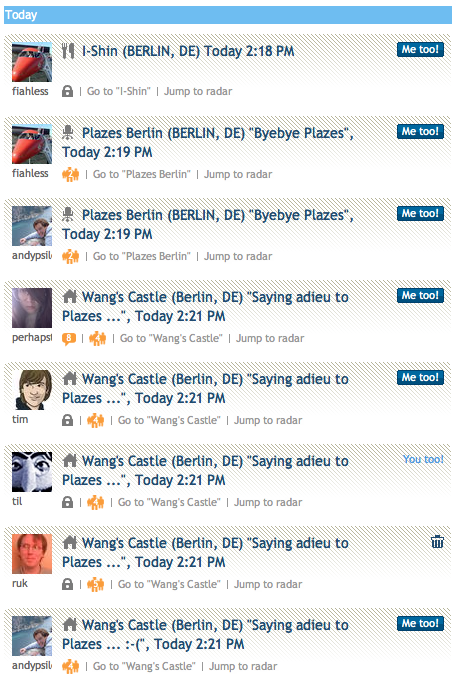
Good-bye Plazes; it was quite a ride.
Across the road from La papeterie Saint-Armand is Lachine Canal National Historic Site which is filled with helpful signage about the industrial past of the area. Here’s a photo of one of the sign-boards with its subject, the water tower behind the former Congoleum plant — juxtaposed to the right. Saint-Armand’s shop is in the basement of the building just out of view in the modern photo on the left.
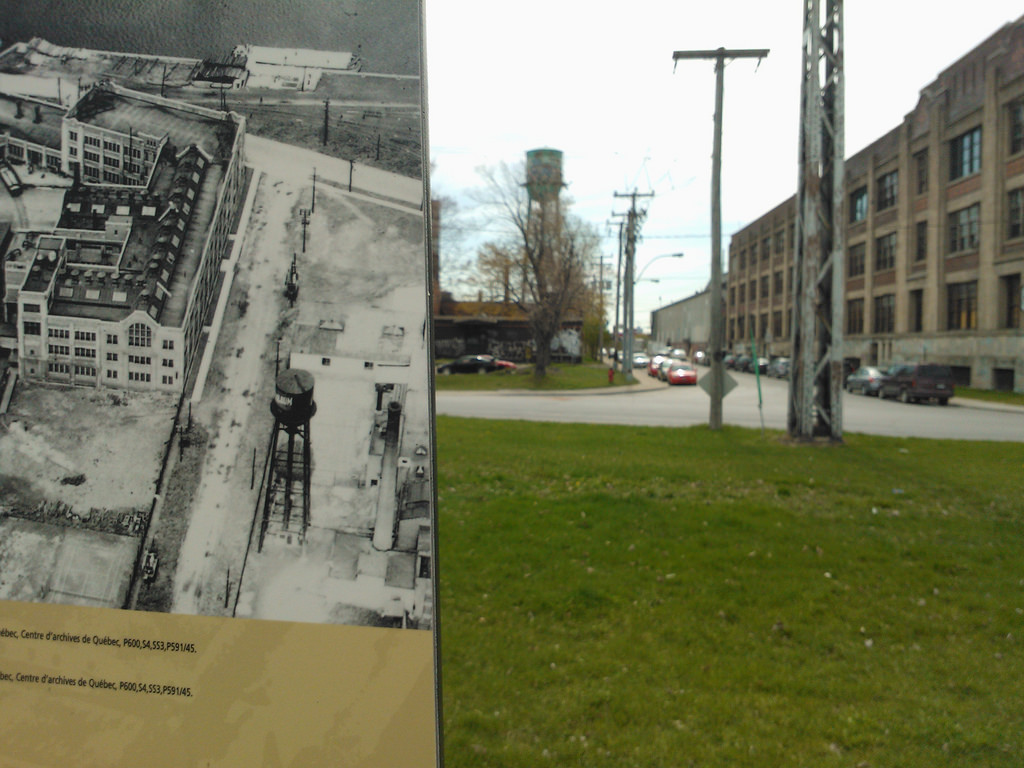
Parks Canada has a fascinating map of the historic North American north-east canal system; I learned, for example, that the Trent-Severn canal is a shortcut from Lake Ontario to Georgian Bay (something that, having lived 5 metres from the banks of the canal when I was in resident at Trent University, I should have known!).
In a bid to learn more about the Confederation Centre of the Arts’ history, I sought out Frank MacKinnon’s book Honour the founders! Enjoy the arts! : Canada’s Confederation Memorial in Charlottetown at the public library. The book, which details the history of the Centre from conception to birth, is a fascinating primer on how to accomplish an impossible project. My favourite passage is this, relating the initial reaction of Premier Matheson to the idea:
The premier’s reaction was all that could be expected at the time: “It cannot be done but if it can we will not stand in your way. You are on your own. We trust it will not cost any money but we will provide the site. If it is a gift we will accept it.” “Will you maintain it?” I asked. “Of course,” was the easy answer when success was not expected. And the premier gave hostages to fortune when he agreed to keep politics out of the project and discourage the interference that so often has ruined local enterprise on the Island and elsewhere. On several occasions he warned that I alone would take the blame should anything go wrong.
For anyone seeking to carry out a project that seems so absurd as to be dismissed out of hand at the mere mention of it, MacKinnon’s book is a must-read, for he provides, in compelling detail, how he managed to assemble the political will required to build the Centre. We owe him a debt, both for the Centre itself, but also for his willingness to lift the curtain and show how it was done.
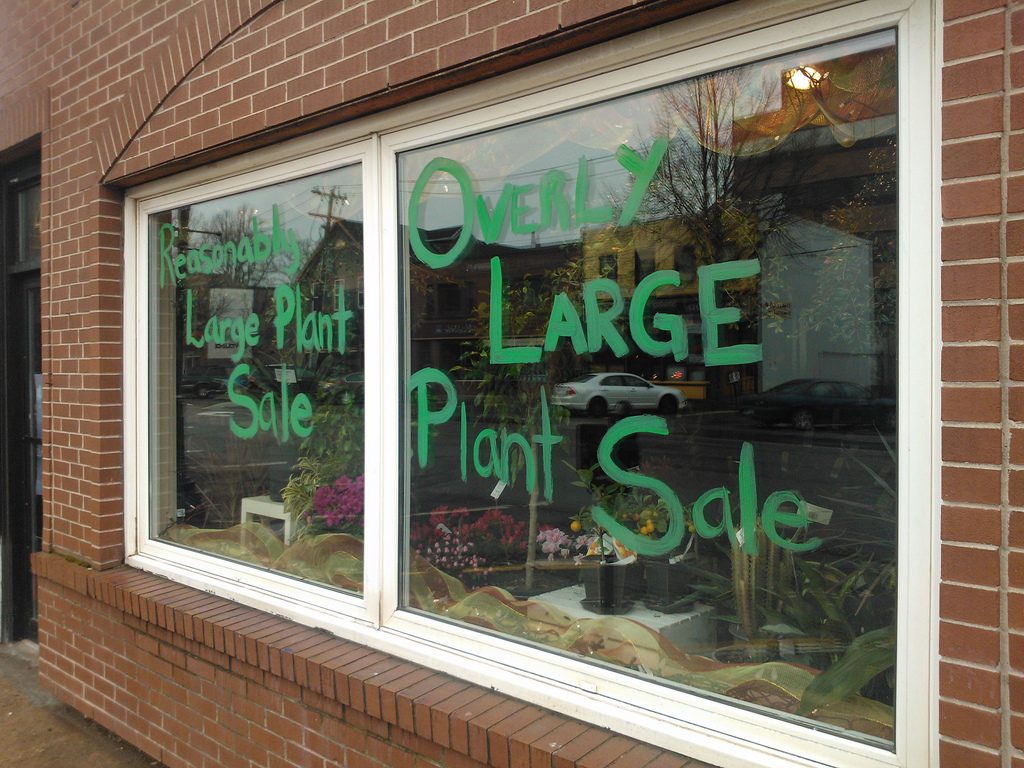
 I am
I am